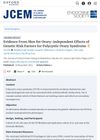Pediatric Features of Genetic Predisposition to Polycystic Ovary Syndrome
September 2023
in “
The Journal of clinical endocrinology and metabolism
”

TLDR Genetic risk for PCOS can affect children's growth, metabolism, and development from early life into adulthood.
The study involved 12,350 children and found that genetic risk factors for Polycystic ovary syndrome (PCOS) are associated with changes in metabolic, growth, and developmental traits in childhood. A higher PCOS polygenic risk score (PRS) was linked with a higher body mass index in midchildhood (0.05 kg/m2 increase per 1 SD of PRS) and a higher risk of obesity in early childhood (OR 1.34). It was also associated with earlier age at pubarche (0.85-month decrease per 1 SD of PRS) and younger age at peak height velocity (0.64-month decrease per 1 SD of PRS). The study also found that a child's PCOS PRS has direct effects on childhood outcomes, independent of the mother's polygenic risk for PCOS. These effects include significant associations with metabolic, growth, and developmental outcomes from midchildhood to late adolescence. The study concluded that genetic liability for PCOS can result in alterations in metabolic, growth, and developmental traits in both sexes starting in early life and extending into adulthood.


